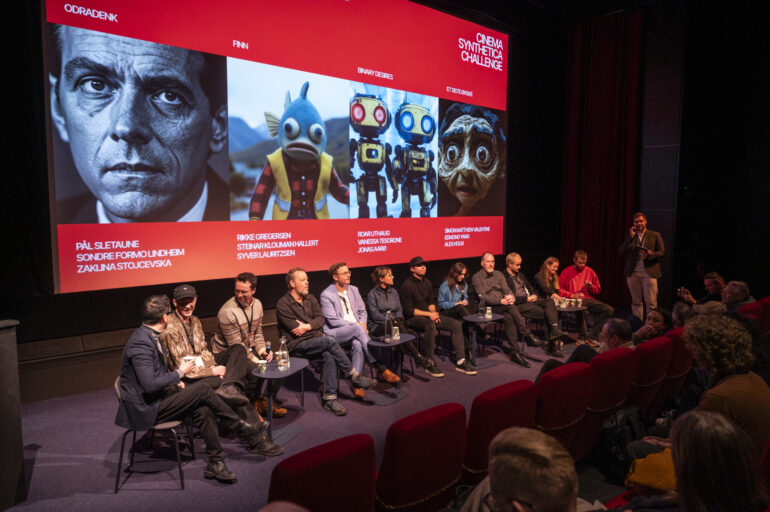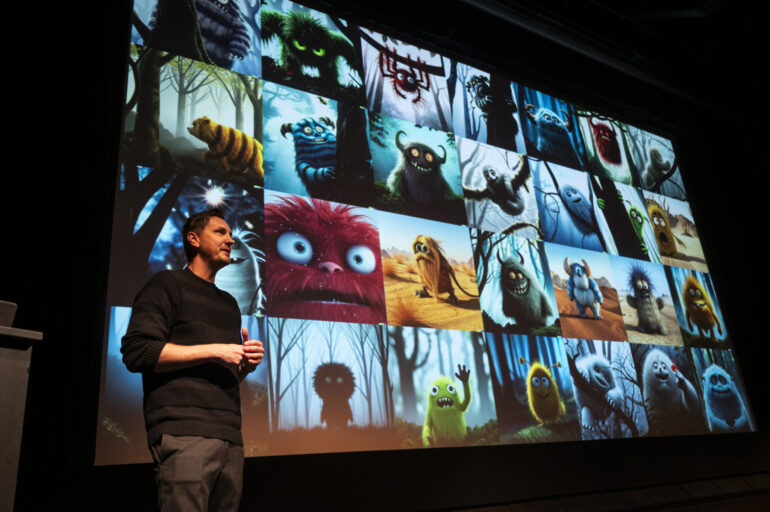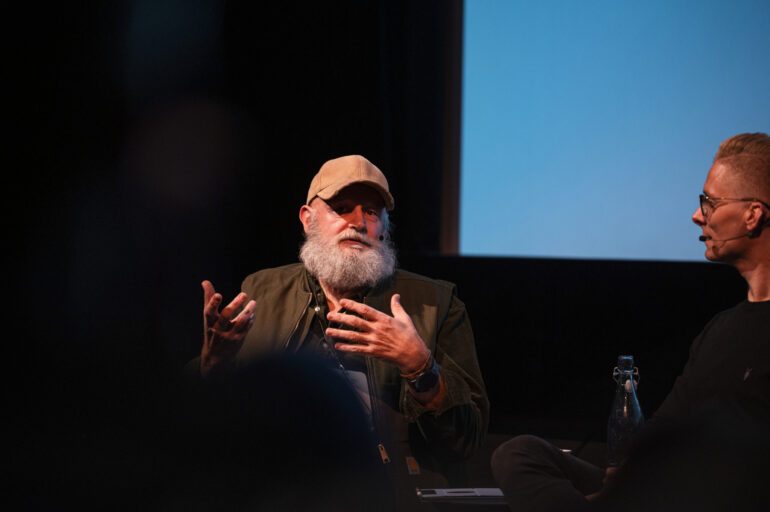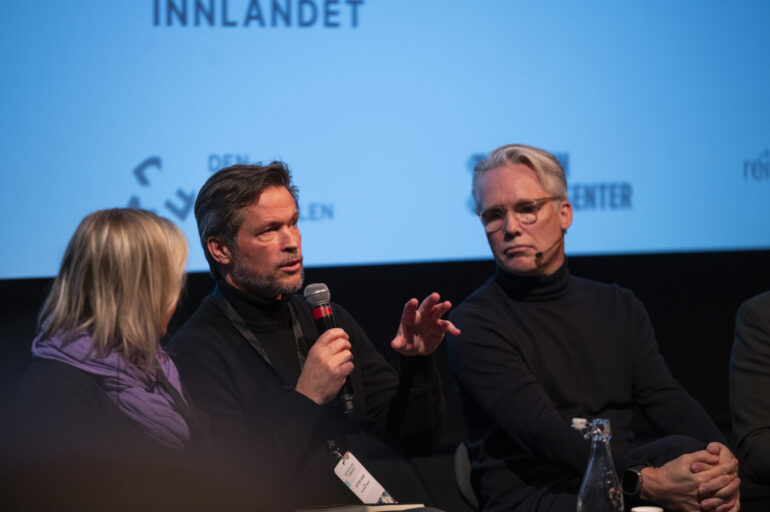Written by: Lina Nystrand
21.11.24
Mindblowing demonstrations, thought-provoking aspects and astonishing new AI short films by Norwegian talents shaped the AI future at sold out industry event.
“We are not victims of the future, we shape it.”
That was one of the main messages when Ian Beacraft, one of the world’s leading AI advisors, kicked off Wednesday’s (November 20) AI conference. At the event, more than 200 scriptwriters, producers, distributors and other industry professionals gathered to learn from well known experts in the field of AI.
“The buzzing energy in the room”, as one of the panel moderators, Silje Riise Næss (Talent Norway) described the atmosphere, reflects the current big momentum of change. Beacraft likened it to the Industrial Revolution, stressing that initially new innovations are often perceived as threats, but as we adapt our methods and environments, we get tools that make our lives “better, faster, cheaper”. During the day alarms were also raised around the fast development of AI.
Is AI killing creativity?
A question frequently raised throughout the day was “Is AI killing creativity?” Beacraft’s answer was that AI automates the process, but not creativity, and that in the end “people who actually master the craft will win”.
Another international successful AI pioneer attending the industry day was Nik Kleverov, Chief Creative Officer for the creative agency Native Foreign, and one of the first to get access to the exclusive AI video model Sora. Kleverov is known for his Emmy-nominated main title design (Narcos) and for the first text-to-video AI generated brand film (Toys"R"Us).
As the son of a nonconformist artist father who was persecuted in the former Soviet Union, Kleverov has a double view on art and AI. Today he’s working with digital storytelling, and he believes AI nurtures human creativity rather than eliminates it.
“I think we need creatives more than ever, honestly. We've hired more people since the AI stuff has happened, and the people that work with us get to do more creative, interesting things. I think creatives are going to be what thrives this next generation.”
Just as Beacraft, Kleverov had a calming message to the filmmakers fearing AI will replace their creativity. He proved his case by showing an AI produced short film about his father.
“True storytellers will win. So find your story, tell your story, and use the tools to do so.”
For everyone working with AI, the seminar demonstrated in multiple sessions the expanding possibilities of AI for the film and series industry – from project development and scriptwriting, to sound design and post production. Visual effects master Theodor Groeneboom (Avatar, Gravity) demonstrated both benefits and difficulties of working with AI in post production, mentioning that due to copyright issues, AI use is banned by some large American studios.
But will AI ever write a script as good as Erlend Loe?
Norwegian writer Erlend Loe debated AI’s possibility to challenge human creativity in a panel together with Beacraft and Morten Goodwill, Professor of Artificial Intelligence at Agder University. One question posed was: When will AI write an Erlend Loe script as good as Erlend Loe does?
While Beacraft and Goodwill said it will be possible sooner than we think, Loe himself was doubtful.
“Maybe an AI engine can mimic my style, but the ideas that come from experience – from pain, loss, fun – that’s not possible to recreate artificially. That’s where I become very doubtful that AI will be threatening the top creators.”
The panel agreed that other jobs connected to language certainly can be threatened by AI. Goodwill highlighted that there are still problems with for example AI translation, as it easily becomes biased due to AI’s lack of understanding of the true context of the writing.
The ethical challenges of AI in film
After a morning with many quite AI positive presentations, the afternoon offered sessions with room for more critical views on ethics, rights and politics connected to AI.
In the AI and ethics panel, Aksel Braanen Sterri, philosopher and research director at Langsikt, communicated deep concerns about how a few big commercial companies and superpowers (primarily US and China) dictate the development and use of AI.
Director Tonje Hessen Schei’s documentary iHuman (2019) was mentioned as a visionary work on the AI industry. In the panel she pointed out how insanely far behind the politicians are in finding out how to regulate AI, adding that they should have taken courses, like the one offered in the room:
“And actually this week, there are some summits in San Francisco where they’re trying to establish Biden’s initiative, which aims to establish a framework for AI before Trump, Elon Musk, and Peter Thiel arrive. (-) Those guys are supposed to take over the whole AI thing, and the first thing they've said they'll do is to deconstruct the initiative. That's where we are right now, today.”
AI in the Nordics
In a session that followed, AI’s impact on the Norwegian and Nordic film industry was discussed. The CEO of Nordisk Film & TV Fond, Liselott Forsman, continued the discussion of some of the central dilemmas, like unsolved copyright issues: “When the legislation lags behind, AI issues are decided afterwards in courtrooms.”
During NFTVF’s theme year “Talent in the Age of AI”, the Fund has kept up the pan-Nordic AI discussion on multiple platforms, also in meetings with Nordic politicians. The Fund’s AI survey with Nordic scriptwriters, published in June, showed that only ⅓ of the respondents used AI, and that many long for more information, especially on rights issues. In December, NFTVF will be summoning Nordic lawyers with AI expertise to a linear debate to be published online.
Leif Holst Jensen, Dean of the faculty of film, TV and games at Inland Norway University of Applied Sciences, was invited to the panel to give the upcoming generation’s perspective on AI. He told NFTVF that many politically active students are conservative when it comes to AI:
“They are afraid that the university professors will be replaced by an AI, or that the grading of their exams will no longer be done by humans, but by robots.”
He emphasises that it’s important to teach students ethical curiosity:
“We need to be curious and test out, but we also need to have what the algorithms perhaps don’t have – critical thinking. And we need to ensure that the students learn this.”
Cinema Synthetica: AI short films made in 48 hours
The AI conference was wrapped up with the premiere of four AI generated short films created by 12 of Norway’s leading filmmakers and creative technologists during the Cinema Synthetica workshop in late October. Divided into four teams, they were challenged to produce a short film within 48 hours, entirely using AI. The short films were all based on a script written by Erlend Loe. The short film directors were Rikke Gregersen, Pål Sletaune, Simon Valentine, and Roar Uthaug.
Erlend Loe told NFTVF he was surprised how much the films differed from each other, and how they managed to achieve such high quality with so little time and budget. About one of the short films, Loe said;
“If someone said they did this in the course of a month, I would’ve been impressed, but in a weekend? It was the lip sync, the animated look, the human voice that makes it emotional from the very beginning. The sky is the limit, you know. Very impressive.”
The short films will be published on NFTVF’s website under Industry Insights within November.
One of the initiators behind the AI conference is Christian Schüssler, founder and creative director at AI studio Reimagine. He said that one of the highlights of the day was to see the attendees’ positive reactions to the AI short films, while the key message was that the Nordic film industry has to take an active part in the AI development.
“We’re a part of shaping this development, and in order to shape it, we need to understand it. We need to bring in expertise and knowledge from many different areas and many different parts of the industry.”
The conference was organised in collaboration with the Norwegian Film Academy, the Norwegian Film School, Oslo Kreativ AI, and Reimagine.



